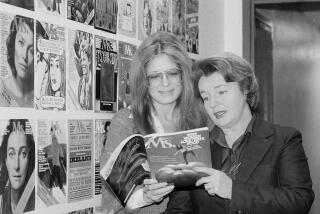Daum: Chick flick TV
- Share via
Perhaps it’s been brought to your attention that this is a big week for retrograde representations of women on television. Monday marked the premiere of NBC’s “The Playboy Club,” a noir-ish look at Hugh Hefner’s flagship Chicago club in 1963, and Sunday will see the launch of ABC’s “Pan Am,” a stylish, soapy paean to those proto-feminist archetypes known as stewardesses. With their curling cigarette smoke and hourglass-shaped, not-necessarily-Pilates-toned actresses, these shows suggest we’re in a moment not just of “Mad Men” withdrawal (it won’t be back until March) but out-and-out fetishization of the 1960s (make that the early 1960s, before things got complicated).
It’s feminist backlash, right? How else to explain why, in an era where real-life women are running for president and running men off the road of life by any number of measures, women in serious dramatic television roles are still wearing girdles and gloves? Why else would producers set two much-hyped shows with female-driven ensemble casts in places where mile-high ass grabs are company-sanctioned and bunny tails are company policy?
Whatever the reason, don’t blame men. For starters, men make up only 40% of TV viewers, according to recent figures. And lest you think that story lines rife with antiquated gender roles are a network ploy to appeal to that 40%, think again. According to Nielsen data, the No. 1 television show watched by men is “American Idol.”
In other words, unlike the movie business, where the conventional wisdom is that male audiences call the shots (hence our current period of film history, which, thanks to auteurs like Judd Apatow, we might call la cinema de fart joke), television programmers have long paid close attention to female viewing habits.
Depending on your tastes, that could be a damning accusation because it suggests that women are responsible for, well, most of what’s on TV. But it also raises some interesting questions about how women — perhaps especially those who’ve come of age since the women’s movement — view their place in the world.
Can any situation depicting some kind of all-women institution automatically have feminist undertones, no matter how retrograde? Is it possible to glamorize oppressive, exploitative work while also offering a critique of it?
What are we to make of “Pan Am” star Christina Ricci’s comment that the show will “send a message of how these women were free and in charge of their lives”? Moreover, how reliable a narrator is Hugh Hefner (yes, the one and only) supposed to be when, in a voice-over at the end of the first episode of “The Playboy Club,” he declares that “the bunnies were some of the only women in the world who could be anyone they wanted to be”?
Plenty of evidence has accrued to suggest that Ricci and Hefner’s views may be more than a little revisionist. Sociologist Arlie Hochschild famously studied the workplace of flight attendants and noted the demands of “emotional labor” as well as physical labor. Even more famously, Gloria Steinem went undercover as a Playboy bunny and revealed in a 1963 magazine article that the pay was lousy, the work physically grueling and the opportunities for advancement negligible. Last month Steinem called for a boycott of the NBC show, claiming that “it’s just not telling the truth about the era.”
That’s undoubtedly true. But in fairness, these programs aren’t claiming to tell the truth. They’re telling stories — fairy tales, even. And just because they’re set in a particular historical period doesn’t mean they should be held to any higher standard of accuracy than any other ridiculous thing on television. After all, who complained that “Little House on the Prairie” minimized the hardships of 19th century pioneers?
Pioneers, of course, aren’t a big market segment these days. On the other hand, women and their many roles, their sexual agency, their dollars and their votes matter. Or at least we’re asked to evaluate TV shows in that light. But, let’s face it, not every show is capable of being a cultural touchstone. Some are just entertainment — the sort that women, for better or worse, can be counted on to watch.
Sisterhood is powerful, sure. But sometimes only in terms of ratings.
More to Read
A cure for the common opinion
Get thought-provoking perspectives with our weekly newsletter.
You may occasionally receive promotional content from the Los Angeles Times.










